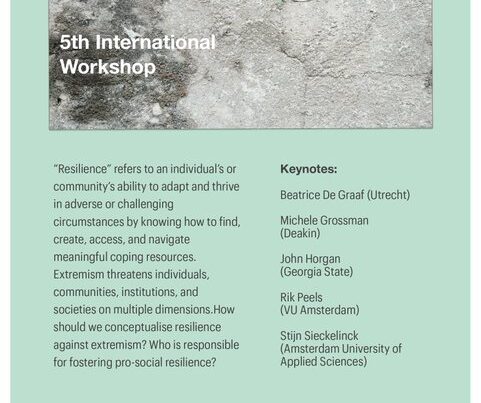Call for papers
The Extreme Beliefs team invites submission of contributed papers for the International Workshop Explaining Extreme Beliefs and Extreme Behavior, to be held at the Vrije Universiteit Amsterdam (the Netherlands) on 15 and 16 September 2022. We particularly encourage scholars working on underrepresented perspectives, such as the global south, to submit an abstract. More information about the workshop can be found here: https://extremebeliefs.com/event/workshop-explaining-extreme-belief-and-extreme-behavior-15-09-22/
Local Organizing Committee
Nora Kindermann, Jedidja Kloens (contact), Naomi Kloosterboer, Chris Ranalli, Rik Peels (chair)
Theme
In the literature, we find explanations on a macro level (in terms of religion, in terms of social, political, economic factors), on a meso level (say, group dynamics), and on a micro level (individual grievances, religiosity, etc.). Can explanations on each of these levels be integrated with one another and what is the importance of each of them (to which explananda are they relevant)? To what extent are various explanations in the literature competitors, or can they be combined? What can explanations of, say, extremism, learn from those of conspiracy theorizing or those of fundamentalism from those of fanaticism? What are important dissimilarities between explanations of these different phenomena and what accounts for these differences? How can first-person explanations – roughly, explanations in terms of factors that subjects themselves would also appeal to in explaining their behavior, such as religiosity, belief, reasons, and narratives – be integrated with third-person explanations – roughly, explanations in terms of factors that others would appeal to in explaining extreme belief and extreme behavior, such as social, political, and economic factors?
There are also more philosophical and methodological questions we can ask about such explanations. Can, say, terrorism be explained at all or is there in the end something incomprehensible about it? How do explanations of extreme behavior and extreme belief differ from other explanations in the humanities, such as those of historical events or other kinds of human behavior, and from explanations in the natural and life sciences, such as those of diseases or the behavior of matter? How does explaining relate to understanding? What are desiderata for sound explanations of, say, fundamentalism and extremism? Should explanations also have predictive power?
Set-up
The workshop is mostly plenary with keynote lectures and two parallel sessions. It is followed, on its second day, by a symposium on interdisciplinarity in seeking explanations for extreme belief and extreme behavior. This symposium will address such questions as: What are the obstacles and challenges to interdisciplinarity when it comes to explaining extreme belief and extreme behavior? What are best practices of interdisciplinarity on this subject? Which questions regarding explanations for extreme phenomena can be tackled by individual disciplines and which ones not? The two events are independent, so one can attend the one without attending the other.
Questions
- Can extreme phenomena such as extremism and terrorism be explained at all?
- How do first-person explanations, such as those in terms of religiosity, relate to third-person explanations, such as those in terms of social, economic, and political factors?
- How does explaining extreme phenomena relate to understanding them?
- How does explaining extreme phenomena relate to predictive power?
- How do micro-, meso-, and macro relate to one another in explanations? (e.g., is one level more fundamental than the other? Does one level determine or constrain another?)
- Is the well-known distinction between push- and pull-factors for extremism (and fundamentalism, etc.) viable?
- How do explanations from belief and behavior differ from those of physical phenomena?
- What are desiderata for explaining, say, extremism and terrorism?
- What are similarities and differences between explaining, say, conspiracy theorizing, fanaticism, and violent extremism?
- How do explanations of extreme beliefs differ from those of extreme behavior?
Submission of contributed papers
An abstract of around 500 words, prepared for blind review, should be sent as an attached Word document or pdf-file to Jedidja Kloens via extremebeliefs.fgw@vu.nl no later than May 20th 2022. The e-mail message should contain <EB2022> in the subject line and the author’s or authors’ names, affiliations, and an e-mail address for contact in the main body. The attached abstract should contain the title of the relevant section, the title of the contributed paper and a short resume of the paper.
Confirmed speakers: Lorne Dawson, John Horgan, Sophia Moskalenko, Rik Peels
Cautionary note
The workshop will be held physically, but also digitally for those who can only attend online
Attendance Fee
Physical attendance: §200 for regular attendees, §150 for PhD students, and §100 for students. The fee includes the workshop dinner on Thursday night.
Digital attendance: for free. Registration will be needed, though.
Important dates and deadlines
20 May: Deadline for the submission of abstracts
3 June: Notification of acceptance
1 September: Deadline for the registration for the workshop (There will be no registration fees but registration is required due to the limited number of places in the conference rooms)
15 and 16: Workshop

